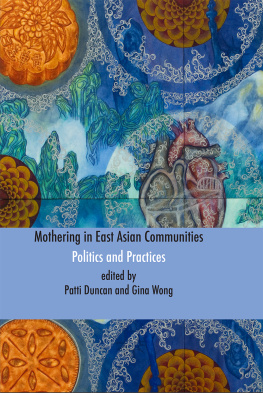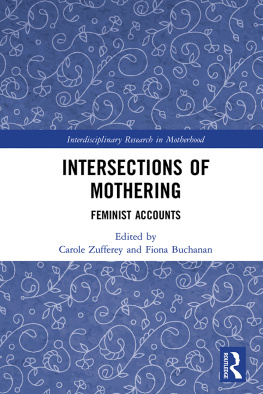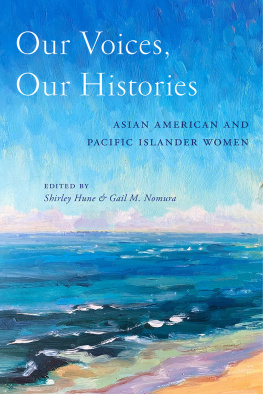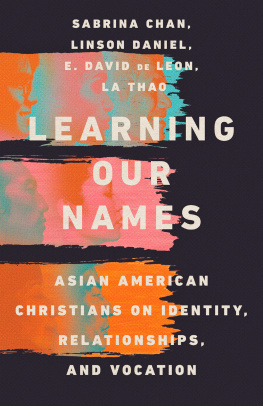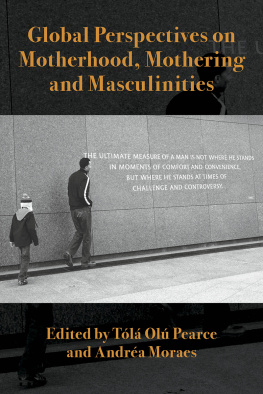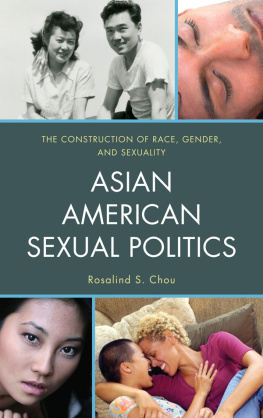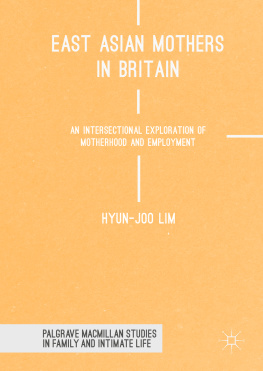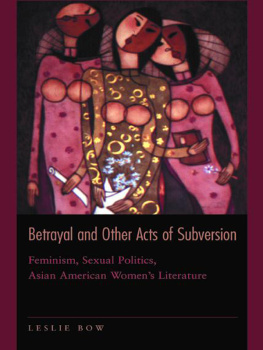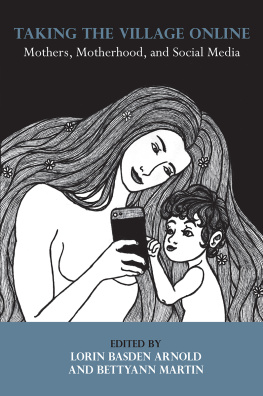Mothering in East Asian Communities: Politics and Practices
Mothering in East Asian Communities
Politics and Practices
Edited by
Patti Duncan and Gina Wong
Copyright 2014 Demeter Press
Individual copyright to their work is retained by the authors. All rights reserved. No part of this book may be reproduced or transmitted in any form by any means without permission in writing from the publisher.
Demeter Press logo based on the sculpture Demeter by Maria-Luise Bodirsky < www.keramik-atelier.bodirsky.de >
Cover Print by Shu-Ju Wang, (Asleep in the Chamber of Mirrors) Moonlight Becomes Frost Becomes Apple Pie Becomes Moon Cake Becomes Moonlight, from Red Bean Paste and Apple Pie, 2012, www.fingerstothebone.com Printed and Bound in Canada.
eBook development: WildElement.ca
Library and Archives Canada Cataloguing in Publication
Mothering in East Asian communities : politics and practices / edited by Patti Duncan and Gina Wong.
Includes bibliographical references.
ISBN 978-1-927335-24-6 (pbk.)
1. MotherhoodPolitical aspectsCanada. 2. Motherhood Social aspects Canada. 3. MotherhoodPolitical aspectsUnited States. 4. MotherhoodSocial aspectsUnited States. 5. Mothers Canada. 6. MothersUnited States. 7. East AsiansCanada. 8. East AsiansUnited States. I. Duncan, Patti, 1970-, editor II. Wong, Gina, 1971-, editor
HQ759.M88398 2014 306.874308995071 C2014-905837-3
Demeter Press
140 Holland Street West P. O. Box 13022
Bradford, ON L3Z 2Y5
Tel: (905) 775-9089
Email: info@demeterpress.org
Website: www.demeterpress.org
Table of Contents
Dedications
Dedicated to our childrenChance, Cassie, Iris, and Kieran.
Acknowledgements
We are grateful to Andrea OReilly whose tireless work in motherhood scholarship has had no bounds in giving voice and affirmation to the experiences of motherhood and mothering across cultures and communities. We greatly appreciate her support and encouragement of our passion and experiences as mothers within East Asian communities. We also want to acknowledge and thank all the contributors to the volume, who worked with us for over two years to see it to its completion. We appreciate your powerful approaches to this subject, and are inspired by your commitment to thinking through the politics and practices of mothering in East Asian communities. We especially want to thank Shu-Ju Wang, for generously offering her art for the cover of the book. We also thank Lyndsay Kirkham at Demeter Press, for her work to get this collection out into the world. And for support in completing this project, we thank Susan Shaw, Karen Mills, and the School of Language, Culture, and Society, at Oregon State University.
As well, we acknowledge mothers of East Asian descent living within the complex, diverse realities of North America. Each day, your pride and dedication to your children, families, and communities are integral to the fabric of these communities, and to the cultures in which we exist. Its our hope that this book honors as well as gives voice and legitimacy to all of our experiences.
I (Patti) thank my partner, Skye, for supporting this work, and my son, Chance, for inspiring it. Im also grateful to Gina, friend and collaborator, for envisioning this project with me.
My(Gina)deepestgratitudegoestoPattiforherworkinseeingthiscollection through and for her great leadership, collaboration, and brilliance. I also thank my partner Tom and my children Iris, Cassie, and Kieran. Bringing this collection to fruition led me to reflect on my parents (Wai Kiang and Grace Wong) experience of emigration to Canada and what it may have been like; and the hardships they encountered to create a better life in Canada. For that, I am particularly thankful.
ACKNOWLEDGEMENTS OF REPRINTED CHAPTERS
Hosu Kim and Grace M. Cho, The Kinship of Violence, from Journal of Korean Adoption Studies , vol. 1, no. 3 (Summer 2012) edited by Jennifer Kwon Dobbs. Copyright 2012 by Global Overseas Adoptees Link. Reprinted by permission of Global Overseas Adoptees Link.
Fiona Tinwei Lam, Chrysanthemum, Kite, and Snowman, from Enter the Chrysanthemum (Caitlin Press, 2009). Reprinted with permission of Vici Johnston, Caitlin Press.
Rita Wong, a wandering daughters grammar, from Monkeypuzzle (Press Gang, 1998). Reprinted with permission of Rita Wong.
Fiona Tinwei Lam, Tiger in the Hornets Nest: The Furor over Amy Chuas Battle Hymn of the Tiger Mother reprinted with permission of bothauthorandpublisherfromTheTyeeonlinenewsmagazine,January 20, 2011: http://thetyee.ca/Life/2011/01/20/TigerMother /.
Introduction
Contextualizing and Politicizing Mothering in East Asian Communities
PATTI DUNCAN AND GINA WONG
The cover of Mothering in East Asian Communities features a recent painting by Asian American artist, Shu-Ju Wang, entitled (Asleep in the Chamber of Mirrors) Moonlight Becomes Frost Becomes Apple Pie Becomes Moon Cake Becomes Moonlight. This polyptych of four panels, painted in gouache and acrylic, is part of a series by the artist, Red Bean Paste and Apple Pie, and engages themes of food as commentary on social and political meanings of East Asian experiences. It represents, in Wangs words, a personal exploration of my story of immigration and a broader look at what it means to be an American. As mothers of East Asian descent, living and working in North America, this painting captures what we desire to convey through this collection. The image at the center of this painting indicates both a beating heart and a small giraffe, evoking feelings about pregnancy, childhood, and the work associated with caring for children. Food and flowers surround this center, with depictions of apple pies and moon cakes,suggestiveofnurturancewithinthecontextofAsianimmigrantfamiliesandcommunities.Westronglyidentifywiththecircularitysuggestedby the paintings title, implying a search for place, a politicization of home, and a persistent sense of movement. To be asleep in the chamber of mirrors signals a sense of rest and caregiving, and simultaneously a process of conscious self-reflection, structured by and through multiple looking relations. To us, Wangs piece delineates the complexities illustrated within the chapters of this collection, revolving around politics and practices of motherhood and mothering in East Asian communities.
In this introduction, we contextualize motherhood/mothering among East Asian women, discussing central themes and current challenges and possibilities that contribute to this discourse. We raise critical questions about the social, cultural, and political meanings of race, class, gender, nation, sexual orientation, and mothering, for Asian women. And we discuss the unique contributions of this volume, which includes writings by scholars, artists, activists, and East Asian mothers, in genres ranging from academic papers representing multiple disciplines and intersecting politics to creative reflections and poetry.
To ground our discussion and make clear our own stakes in this discourse, we briefly contextualize our relationships to motherhood within East Asian communities. We do so with the hope of engaging feminist principles of standpoint theory and situated knowledges, making clear how our lived, daily experiences are connected to larger social and political processes. We are committed to thinking through the intersections of race, ethnicity, gender, class, sexuality, culture, and national belonging that shape the experiences of East Asian mothers, both in our home countries and in diasporic communities, and we situate ourselves to highlight the ways in which our personal experiences are grounded in larger, social/structural processes. Patti Duncan is an Asian Pacific American feminist scholar and mother, of Korean and Scottish descent. She identifies as mixed race, keenly attentive to the distinct cultural meanings this marker carries in the U.S. and South Korea. As the child of a Korean immigrant mother and a white U.S. former army serviceman, Patti grew up with the stigma associated with both KoreancamptownworkersandAsianmilitarybridesintheU.S.Now,asthe mother of a mixed race son, she is interested in exploring the ways our reproductivelaborasEastAsianfeministmothersmayoffsetthemultiple systemsofoppressionthatourchildrenencounterinanincreasinglyglobalized world. Gina Wong is a Chinese Canadian psychologist, feminist writer, researcher,andacademicwhoispassionateaboutunderstandingmothering and motherhood from scholarly and academic perspectives. She was born and lived in Montreal, Quebec until the age of nine years old with her two older sisters and Chinese immigrant parents. At the age of ten, her family moved to Edmonton, Alberta and her younger sister was born. In her girlhood, Gina experienced discrimination and racism from her peers. As well, her parents experienced issues of acculturation, which affected the family dynamics in deeply entrenched ways. As a mother of two young mixed race daughters, and as a psychologist who works with Asian girls and women, Gina is keenly motivated to understand, give voice to, and engender sensitivity around experiences of East Asian girls, women, and mothers.

